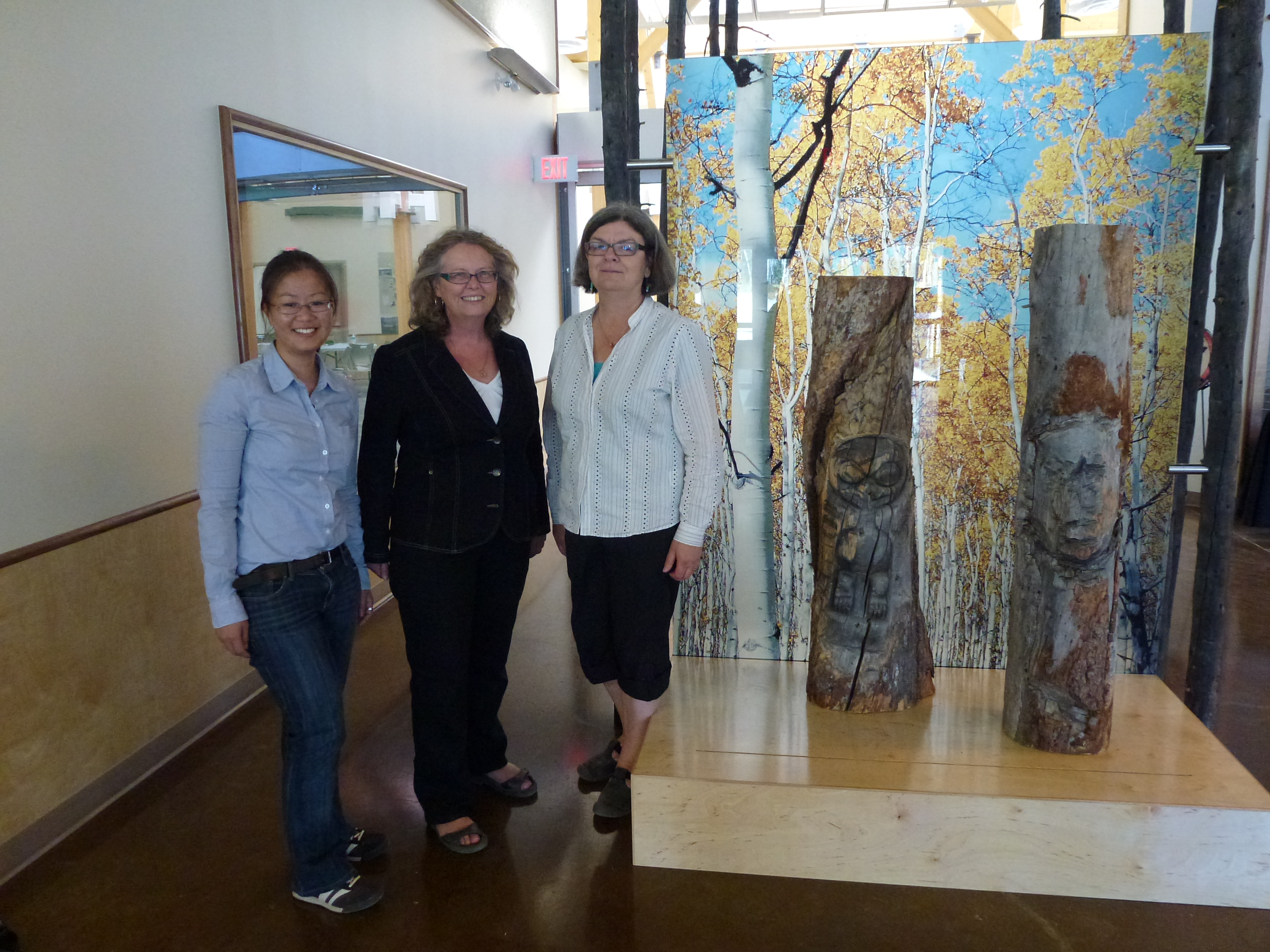
(l-r): Jessica Lai visiting doctoral student; Professor Catherine Bell, U of A Faculty of Law; and Sheila Greer, research partner/ archaeologist Champagne Aishihik First Nation at Da Ku Cultural Centre, Haines Junction, Yukon
The University of Alberta's Faculty of Law was happy to recently play host to Jessica Lai, a research fellow from Switzerland, who came to the Faculty of Law as a visiting PhD student to work with Professor Catherine Bell on a research project entitled, 'Law, Ethics, and Respect for Indigenous Intangible Heritage in Museum Contexts'.
Jessica Lai, was working at the University of Lucerne, Switzerland, for a project entitled the 'International Trade in Indigenous Cultural Heritage' (ITCH) , funded by the Swiss National Science Foundation. As part of the project, she came to know U of A Faculty of Law professor Catherine Bell during an international workshop Jessica helped organize in January 2010 for International Communications and Art Law, Faculty of Law, Lucerne. Professor Bell was a keynote speaker on the rights of Canada's Indigenous peoples in relation to intangible cultural heritage. This initial meeting inspired Jessica to contact Professor Bell to conduct a research mission as part of the ITCH project. Professor Bell agreed to co-author a study with her drawing on Jessica's expertise in international intellectual property law. Jessica arrived in Edmonton in July 2012 ready to start work, at the U of A Faculty of Law, on their project.
"In a few weeks, I had punched out fifty pages or so about how international copyright law and its national implementation can hinder museums and archives from meeting the interests of Indigenous peoples, even when they want to," said Jessica. "Surprisingly, it is a little-explored area. This formed my part of our work on 'Law, Ethics, and Respect for Indigenous Intangible Heritage in Museum Contexts'."
Whilst Jessica was at the U of A Faculty of Law, Professor Bell was planning to do some field work up in the Yukon with youth from the Champagne Aishihik First Nation in Haines Junction, and invited the visiting PhD student to come with her. "I'm one of those theoretical people who lives a lot in books, so I was both excited and a little bit terrified to be working with real people," said Jessica. "It turned out that my apprehension was completely unfounded." Jessica described her meeting with the youth from the Champagne Aishihik First Nation as being a moving experience which brought home to her how relevant her area of research was. "I had intended to take some notes, but after a few minutes found myself too transfixed," said Jessica. "Listening to the youth speak was very validating for me; the last few years of my life that I have spent researching about Indigenous peoples' rights to their cultural heritage is relevant. It does mean something. In front of me was the next generation, showing that - though they may not exactly understand the legal minefield before them - their cultural heritage is important to them and plays a vital role in their daily lives."
During Jessica's time in Canada she once more saw her research reflected in reality, but this experience was very different to the one she had experienced in the Yukon with the First Nation youth, when she encountered difficulty in finding authentically Indigenous made goods in shops. Jessica found a general lack of understanding by shop owners and workers as to what constituted "authentically Indigenous made goods", and was often offered "Canadian made goods", as if that was the same thing. "In fact, most of the time, the shopkeepers seemed surprised that I was asking and was interested," said Jessica. "Again, I saw my research reflected in reality. My experiences showed me the importance of correct labelling and the potential value of using certification trade marks, something I have also written about."
"Overall, I am grateful to have had the chance to visit the University of Alberta and the Yukon. Working with Catherine opened the door to opportunities I otherwise never could have gained access to myself. In many ways, it was like a reward at the end of my PhD and I can't imagine a better or more suitable reward."
Associate Dean (Graduate Studies) Russ Brown was pleased that the Faculty of Law was able to foster the collaborative relationship between Jessica and Professor Bell. "This is precisely the sort of scholarly activity that we seek to facilitate by hosting visiting scholars, graduate students and post-doctoral researchers", he explained. "Jessica's experience with us shows how our outstanding research facilities, faculty members and opportunities for collaboration can create a valuable experience for visitors, while enhancing our own scholarly outputs."
For Professor Bell, there is nothing more satisfying than working with new scholars interested in conducting legal research "on issues that have significant ramifications in the daily lives of First Nations, Inuit, Metis and other Indigenous peoples." There is a place where legal theory, application and implementation of law meet. Helping new scholars see these connections and the importance of stretching how we think about the law in order to facilitate legal and other aspirations of Indigenous peoples is not easily learned from books. Of course, the added bonus of working with visiting doctoral students and research fellows says Professor Bell is "she also gets to learn from all the new and wonderful ideas and perspectives they bring to a project." Everyone learns and benefits. Jessica is one of three research fellows working with Professor Bell on issues of Indigenous intangible heritage. She will be welcoming a fourth visiting Phd law student from Japan in January 2013.